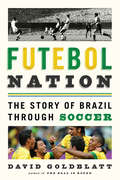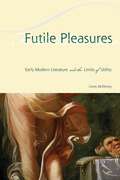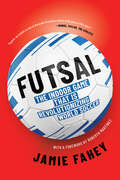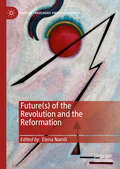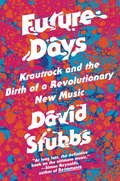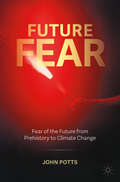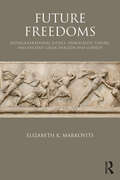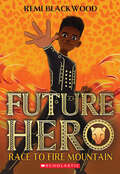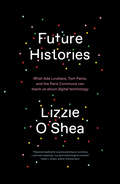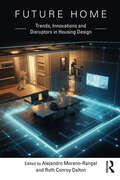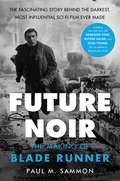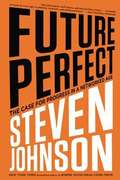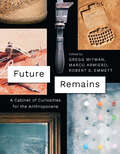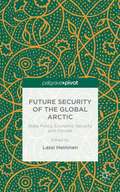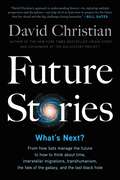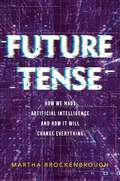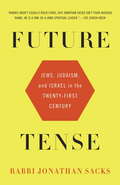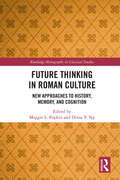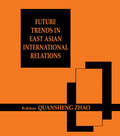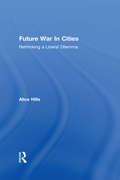- Table View
- List View
Futebol Nation: The Story Of Brazil Through Soccer
by David GoldblattNo nation is as closely identified with the game of soccer as Brazil. For over a century, Brazil's people, politicians, and poets have found in soccer the finest expression of the nation's collective potential. <P><P>Since the team's dazzling performance in 1938 at the World Cup in France, Brazilian soccer has been revered as an otherworldly blend of the effective and the aesthetic. <P>"Futebol Nation" is an extraordinary chronicle of a nation that has won the World Cup five times and produced players of miraculous skill, such as Pele, Garrincha, Rivaldo, Zico, Ronaldo, and Ronaldinho. It shows why the phrase "O Jogo Bonito" (the Beautiful Game)has justly entered the global lexicon. Yet there is another side to Brazil and its game, one that reflects the sociological realities.
Futile Pleasures: Early Modern Literature and the Limits of Utility
by Corey McEleneyHonorable Mention, 2018 MLA Prize for a First BookAgainst the defensive backdrop of countless apologetic justifications for the value of literature and the humanities, Futile Pleasures reframes the current conversation by returning to the literary culture of early modern England, a culture whose defensive posture toward literature rivals and shapes our own.During the Renaissance, poets justified the value of their work on the basis of the notion that the purpose of poetry is to please and instruct, that it must be both delightful and useful. At the same time, many of these writers faced the possibility that the pleasures of literature may be in conflict with the demand to be useful and valuable. Analyzing the rhetoric of pleasure and the pleasure of rhetoric in texts by William Shakespeare, Roger Ascham, Thomas Nashe, Edmund Spenser, and John Milton, McEleney explores the ambivalence these writers display toward literature’s potential for useless, frivolous vanity. Tracing that ambivalence forward to the modern era, this book also shows how contemporary critics have recapitulated Renaissance humanist ideals about aesthetic value. Against a longstanding tradition that defensively advocates for the redemptive utility of literature, Futile Pleasures both theorizes and performs the queer pleasures of futility. Without ever losing sight of the costs of those pleasures, McEleney argues that playing with futility may be one way of moving beyond the impasses that modern humanists, like their early modern counterparts, have always faced.
Futility, Or The Wreck of the Titan: Or, Futility
by Morgan RobertsonWhen the "unsinkable" ship the Titan strikes an iceberg, John Rowland, a former naval lieutenant, heroically saves the life of a young girl as the ship founders and eventually sinks, leaving them stranded in the desolate and frigid North Atlantic.Be it mystery, romance, drama, comedy, politics, or history, great literature stands the test of time. ClassicJoe proudly brings literary classics to today's digital readers, connecting those who love to read with authors whose work continues to get people talking. Look for other fiction and non-fiction classics from ClassicJoe.
Futsal: The Story of an Indoor Football Revolution
by Jamie Fahey"All the best players began with futsal!" - Pelé "If it wasn't for futsal, I wouldn't be the player I am today." -- Cristiano Ronaldo The untold story of soccer's little brother futsal, the grassroots game that is the secret behind the success of Pelé, Neymar, Messi, Ronaldo and the US star Christian Pulisic Futsal, a form of indoor soccer, is one of the fastest growing sports in the world. Jamie Fahey uncovers its global stories, tactical innovations and fascinating history and reveals its the secret behind the success of the likes of Brazilians Ronaldhino, Ronaldo Fenômeno and Romario and the kind of soccer revolutionized by Pep Guardiola at Barcelona – with Spain&’s Xavi Hernández and Andrés Iniesta – and at Manchester City, with Belgium&’s Kevin De Bruyne and Brazilian goalkeeper Ederson. As Brazilian superstar Neymar said: &‘It has developed my technique, quick thinking and short moves...Futsal is fundamental to a footballer&’s life. It had a big importance in mine. When you&’re out there playing, you&’re forced to think fast and move even faster – if you lose a second, then the ball will be gone." Born in Uruguay almost a century ago but raised to an art form in Brazil, futsal is one of the fastest-growing sports on the planet: over 60 million people play this lightning-fast and tactically intricate variation of indoor soccer, which is also a bona fide professional sport in its own right. Despite its growing status, however, futsal&’s history remains largely unknown and untold. Jamie Fahey is a leading futsal expert and qualified youth coach. He spent his childhood playing endless soccer matches in the shattered urban landscape of 1980s Liverpool – on the same streets later graced by Wayne Rooney, the &‘last true street footballer&’. Yet when Fahey&’s own soccer career stalled, he realised he had been unwittingly learning the skills that pointed to his true passion. In Futsal: The Indoor Game Revolutionizing World Soccer, Fahey makes the case for futsal&’s transformative grassroots effect, both in the UK and abroad. He also tells the story of futsal&’s politics, tactics and personalities – and in doing so, illuminates a hidden corner of sporting history.
Future (Radical Theologies and Philosophies)
by Elena NamliThis volume brings together philosophers, social theorists, and theologians in order to investigate the relation between future(s) of the Revolution and future(s) of the Reformation. It offers reflections on concepts and interpretations of revolution and reformation that are relevant for the analysis of future-oriented political practices and political theologies of the present time.
Future Days
by David StubbsA sweeping history of the men and women who transformed postwar Germany--and created a musical genre that revolutionized rock and roll and gave birth to hip-hop. West Germany after World War II was a country in shock: estranged from its recent history, and adrift from the rest of Europe. But this orphaned landscape proved fertile ground for a generation of musicians who, from the 1960s onwards, would develop the strange and beautiful sounds that became known as Krautrock. Eschewing the easy pleasures of rock and roll and the more substantive seductions of blues and jazz, they took their inspiration from elsewhere: the mysticism of the East; the fractured classicism of Stockhausen; the grinding repetition of industry; the dense forests of the Rhineland; the endless winding of Autobahns. Faust, Neu!, Cluster, Ash Ra Tempel, Amon Düül II, Can, Kraftwerk--the influence of these groups' music on Western popular music is incalculable. They were key to the development of movements ranging from post-punk to electronica and hip-hop and have directly inspired artists as diverse as David Bowie, Talking Heads, and LCD Soundsystem. Future Days is the brilliantly reported, deeply researched story of the groups that created Krautrock, and a social and cultural history of the Germany that challenged, inspired, and repelled them.From the Hardcover edition.
Future Fear: Fear of the Future from Prehistory to Climate Change
by John PottsThis book places the contemporary fear of climate change in historical perspective, showing that throughout human history the dominant perspective on the future has been one of fear. Across a broad historical sweep, the book describes the varied means employed to predict and control the future: magic, religion, science, and technology. Future Fear traces fear of the future from prehistory to the present, culminating in the contemporary fear of imminent climate change catastrophe. Consideration is also given to hope in a more positive future, revealing that visions of the future have often been a mingling of fear and hope.
Future Freedoms: Intergenerational Justice, Democratic Theory, and Ancient Greek Tragedy and Comedy
by Elizabeth K. MarkovitsWhat do present generations owe the future? In Future Freedoms, Elizabeth Markovits asks readers to consider the fact that while democracy holds out the promise of freedom and autonomy, citizens are always bound by the decisions made by previous generations. Motivated by the contemporary political and theoretical landscape, Markovits examines the relationship between democratic citizenship and time by engaging ancient Greek tragedy and comedy. She reveals the ways in which democratic thought in the West has often hinged on ignoring intergenerational relationships and the obligations they create in favor of an emphasis on freedom as sovereignty. She claims that democratic citizens must develop a set of self-directed practices that better acknowledge citizens’ connections across time, cultivating a particular orientation toward themselves as part of much larger transgenerational assemblages. As celebrations and critiques of Athenian political identity, the ancient plays at the core of Future Freedoms remind readers that intergenerational questions strike at the heart of the democratic sensibility. This invaluable book will be of interest to students, researchers, and scholars of political theory, the history of political thought, classics, and social and political philosophy.
Future Hero
by Remi BlackwoodThe start of a thrilling, highly illustrated series about a boy who finds a portal to a legendary world in his local barbershop . . . and learns he's the hero they've been waiting for. For younger fans of Black Panther and Last Gate of the Emperor!Jarell has never quite known where he belongs. He's ignored at home and teased at school for wanting to draw instead of playing sports with the other boys. The only place he's ever felt truly at ease is his local barbershop where the owner hangs Jarell's art up on the walls.When Jarell discovers a hidden portal in the barbershop, he's transported to a magical world that's unlike anything he's seen before. But it's not just the powerful gods and dangerous creatures that makes this world different--it's that everyone believes Jarell is the hero they've been waiting for.
Future Histories: What Ada Lovelace, Tom Paine, and the Paris Commune Can Teach Us About Digital Technology
by Lizzie O'SheaA highly engaging tour through progressive history in the service of emancipating our digital tomorrow.When we talk about technology we always talk about tomorrow and the future -- which makes it hard to figure out how to even get there. In Future Histories, public interest lawyer and digital specialist Lizzie O'Shea argues that we need to stop looking forward and start looking backwards. Weaving together histories of computing and progressive social movements with modern theories of the mind, society, and self, O'Shea constructs a "usable past" that can help us determine our digital future.What, she asks, can the Paris Commune tell us about earlier experiments in sharing resources--like the Internet--in common? How can Frantz Fanon's theories of anti colonial self-determination help us build digital world in which everyone can participate equally? Can debates over equal digital access be helped by American revolutionary Tom Paine's theories of democratic, economic redistribution? What can indigenous land struggles teach us about stewarding our digital climate? And, how is Elon Musk not a future visionary but a steampunk throwback to Victorian-era technological utopians?In engaging, sparkling prose, O'Shea shows us how very human our understanding of technology is, and how when we draw on the resources of the past, we can see the potential for struggle, for liberation, for art and poetry in our technological present. Future Histories is for all of us--makers, coders, hacktivists, Facebook-users, self-styled Luddites--who find ourselves in a brave new world.
Future Home: Trends, Innovations and Disruptors in Housing Design
by Ruth Conroy Dalton Alejandro Moreno-RangelGlobal pandemics, smart technologies, demographics and climate change are just some of the external disruptors that may impact the home’s evolution over the next ten years. Future Home provides a comprehensive ‘horizon scan’ of what our homes may be like approximately ten years from now, by looking for early signs of potentially important developments through a systematic examination of trends, innovations and disruptors. The authors consider what aspects of the home are likely to remain constant and what aspects may change beyond all recognition and if changes are predicted, what form they may take and, most importantly, what this means for design professionals. Exploring areas of buildings and technology, people and delivery, each chapter addresses the catalysts, natures and responses to these changes. This book provides an overview of the future home that will be essential reading for designers, policy-makers and homeowners alike.
Future Knight (Roland Wright #1)
by Tony DavisIn 1409, skinny, clumsy Roland, the ten-year-old son of a blacksmith, pursues his dream of becoming a knight.
Future Noir: The Making of Blade Runner
by Paul M. SammonUpdated edition: The ultimate guide to Ridley Scott’s transformative sci-fi classic Blade Runner, with photos, new cast interviews, and more.Based on Philip K. Dick’s brilliant and troubling science fiction masterpiece Do Androids Dream of Electric Sheep?, Blade Runner is among the most visually dense, thematically challenging, and influential science fiction films ever made. Future Noir offers a deeper understanding of this cinematic phenomenon that is storytelling and visual filmmaking at its best.In an intensive, intimate, and anything-but-glamorous behind-the-scenes account, Paul M. Sammon explores how Ridley Scott purposefully used his creative genius to transform the work of science fiction’s most uncompromising author into a critical sensation and cult classic that would reinvent the genre. Sammon reveals how the making of the original Blade Runner was a seven-year odyssey that would test the stamina and the imagination of writers, producers, special effects wizards, and the most innovative art directors and set designers in the industry at the time it was made. This revised and expanded edition of Future Noir includes:An overview of Blade Runner’s impact on moviemaking and popular culture An exploration of the history of Blade Runner: The Final Cut and its theatrical release in 2007A look at its long-awaited sequel, Blade Runner 2049The longest interview Harrison Ford has ever granted about Blade RunnerExclusive new interviews with Rutger Hauer and Sean YoungA fascinating look at the ever-shifting interface between commerce and art, illustrated with production photos and stills, Future Noir provides an eye-opening and enduring look at modern moviemaking, the business of Hollywood, and one of the greatest films of all time.
Future Perfect
by Steven JohnsonCombining the deft social analysis of Where Good Ideas Come From with the optimistic arguments of Everything Bad Is Good for You, New York Times bestselling author and one of the most inspiring visionaries of contemporary culture, Steven Johnson, maps the ways a connected world will be both different and better. Steven Johnson proposes that a new model of political change is on the rise transforming everything from local government to classrooms to health care. It's a compelling new political worldview that breaks with traditional categories of liberal or conservative thinking. Johnson explores this innovative vision through a series of fascinating narratives: from the "Miracle on the Hudson" to the planning of the French railway system; from the battle against malnutrition in Vietnam to a mysterious outbreak of strange smells in downtown Manhattan; from underground music video artists to the invention of the Internet itself. At a time when the conventional wisdom holds that the political system is hopelessly gridlocked with old ideas, Future Perfect makes the timely and uplifting case that progress is still possible.
Future Remains: A Cabinet of Curiosities for the Anthropocene
by Gregg Mitman Marco Armiero Robert EmmettWhat can a pesticide pump, a jar full of sand, or an old calico print tell us about the Anthropocene—the age of humans? Just as paleontologists look to fossil remains to infer past conditions of life on earth, so might past and present-day objects offer clues to intertwined human and natural histories that shape our planetary futures. In this era of aggressive hydrocarbon extraction, extreme weather, and severe economic disparity, how might certain objects make visible the uneven interplay of economic, material, and social forces that shape relationships among human and nonhuman beings? Future Remains is a thoughtful and creative meditation on these questions. The fifteen objects gathered in this book resemble more the tarots of a fortuneteller than the archaeological finds of an expedition—they speak of planetary futures. Marco Armiero, Robert S. Emmett, and Gregg Mitman have assembled a cabinet of curiosities for the Anthropocene, bringing together a mix of lively essays, creatively chosen objects, and stunning photographs by acclaimed photographer Tim Flach. The result is a book that interrogates the origins, implications, and potential dangers of the Anthropocene and makes us wonder anew about what exactly human history is made of.
Future Security of the Global Arctic: State Policy, Economic Security And Climate
by Lassi HeininenIn the globalized Arctic there has been a transformation from military security to human security. Climate change, the utilization of Arctic resources and other global challenges have caused the Arctic 'paradox' and a need to redefine security.
Future Shock
by Alvin TofflerDescription of the world's response to change and how it affects our lives.
Future Shock: Jesus and the End of the World (Reality Check)
by Mark AshtonThe Reality Check series makes just one assumption: that you’re serious enough about your spiritual journey to investigate Christianity with an open mind. This isn’t about joining anyone’s religious club—it’s about being real with yourself and with the others in your group. Since no one has all the answers, there’s plenty of room for discussion. After all, if there is any truth to the Bible’s stories about Jesus, then one thing he’d welcome are questions and opinions that come from honest, earnest hearts.What do you think the future holds? Right now it looks pretty scary. And Bible prophecy hardly brightens the picture—not with its mind-boggling images of singing saints, ten-horned monsters, mystical numbers, and a lake of fire. What does it all mean? Fortunately, it does mean something. A great deal. And while the Bible paints a grim future for a world bent on worshiping its own ways, it offers great hope for those whose hearts are set on God. Future Shock includes these sessions: Will Jesus Return This Year? · The Scroll Opener · After the Gavel Falls . . . · Ultimate Evil: The Antichrist, the Beast, and 666 · Happily Ever After? · Flight TrainingFor the Group LeaderReality Check is for spiritual seekers of every persuasion. Uncompromisingly Christian in its perspective, it steers wide of pat answers and aims at honesty. This innovative and thought-provoking series will challenge you and those in your group to connect heart to heart as together you explore the interface between Jesus, the Bible, and the realities of this world in which we live.
Future Stories: What's Next?
by David ChristianThe New York Times bestselling author of Origin Story, who Bill Gates has &“long been a fan of,&” turns his attention to the future of humanity — and how we think about it — in this ambitious book. The future is uncertain, a bit spooky, possibly dangerous, maybe wonderful. We cope with this never-ending uncertainty by telling stories about the future, future stories. How do we construct those stories? Where is the future, the place where we set those stories? Can we trust our future stories? And what sort of futures do they show us? This book is about future stories and future thinking, about how we prepare for the future. Think of it as a sort of User&’s Guide to the Future. We all need such a guide because the future is where we will spend the rest of our lives. David Christian, historian and author of Origin Story, is renowned for pioneering the emerging discipline of Big History, which surveys the whole of the past. But with Future Stories, he casts his sharp analytical eye forward, offering an introduction to the strange world of the future, and a guide to what we think we know about it at all scales, from the individual to the cosmological. Christian consults theologians, philosophers, scientists, statisticians, and scholars from a huge range of places and times as he explores how we prepare for uncertain futures, including the future of human evolution, artificial intelligence, interstellar travel, and more. By linking the study of the past much more closely to the study of the future, we can begin to imagine what the world will look like in a hundred years and consider solutions to the biggest challenges facing us all.
Future Tense: How We Made Artificial Intelligence—and How It Will Change Everything
by Martha BrockenbroughHuman history has always been shaped by technology, but AI is like no technology that has come before it. Unlike the wheel, combustion engines, or electricity, AI does the thing that humans do best: think. While AI hasn’t reproduced the marvelously complex human brain, it has been able to accomplish astonishing things. AI has defeated our players at games like chess, Go, and Jeopardy!. It’s learned to recognize objects and speech. It can create art and music. It’s even allowed grieving people to feel as though they were talking with their dead loved ones.On the flip side, it’s put innocent people in jail, manipulated the emotions of social media users, and tricked people into believing untrue things.In this non-fiction book for teens, acclaimed author and teacher Martha Brockenbrough guides readers through the development of this world-changing technology, exploring how AI has touched every corner of our world, including education, healthcare, work, politics, war, international relations, and even romance. This is essential reading for anyone who wants to understand how artificial intelligence got here, how to make the best use of it, and how we can expect it to transform our lives.
Future Tense: Jews, Judaism, and Israel in the Twenty-First Century
by Jonathan SacksOne of the most admired religious thinkers of our time issues a call for world Jewry to reject the self-fulfilling image of "a people alone in the world, surrounded by enemies" and to reclaim Judaism's original sense of purpose: as a partner with God and with those of other faiths in the never-ending struggle for freedom and social justice for all. We are in danger, says Rabbi Jonathan Sacks, of forgetting what Judaism's place is within the global project of humankind. During the last two thousand years, Jews have lived through persecutions that would have spelled the end of most nations, but they did not see anti-Semitism written into the fabric of the universe. They knew they existed for a purpose, and it was not for themselves alone. Rabbi Sacks believes that the Jewish people have lost their way, that they need to recommit themselves to the task of creating a just world in which the divine presence can dwell among us. Without compromising one iota of Jewish faith, Rabbi Sacks declares, Jews must stand alongside their friends--Christian, Muslim, Hindu, Sikh, Buddhist, and secular humanist--in defense of freedom against the enemies of freedom, in affirmation of life against those who desecrate life. And they should do this not to win friends or the admiration of others but because it is what a people of God is supposed to do. Rabbi Sacks's powerful message of tikkun olam--using Judaism as a blueprint for repairing an imperfect world--will resonate with people of all faiths.From the Hardcover edition.
Future Thinking in Roman Culture: New Approaches to History, Memory, and Cognition (Routledge Monographs in Classical Studies)
by Maggie L. Popkin Diana Y. NgFuture Thinking in Roman Culture is the first volume dedicated to the exploration of prospective memory and future thinking in the Roman world, integrating cutting edge research in cognitive sciences and theory with approaches to historiography, epigraphy, and material culture. This volume opens a new avenue of investigation for Roman memory studies in presenting multiple case studies of memory and commemoration as future-thinking phenomena. It breaks new ground by bringing classical studies into direct dialogue with recent research on cognitive processes of future thinking. The thematically linked but methodologically diverse contributions, all by leading scholars who have published significant work in memory studies of antiquity, both cultural and cognitive, make the volume well-suited for classical studies scholars and students seeking to explore cognitive science and philosophy of mind in ancient contexts, with special appeal to those sharing the growing interest in investigating Roman conceptions of futurity and time. The chapters all deliberately coalesce around the central theme of prospection and future thinking and their impact on our understanding of Roman ritual and religion, politics, and individual motivation and intention. This volume will be an invaluable resource to undergraduate and postgraduate students of classics, art history, archaeology, history, and religious studies, as well as scholars and students of memory studies, historical and cultural cognitive studies, psychology, and philosophy.
Future Trends in East Asian International Relations: Security, Politics, and Economics in the 21st Century
by Quansheng ZhaoThe world has undergone significant change since the end of the Cold War. One such development is that the Asia-Pacific has become increasingly prominent in international affairs. This comprehensive study provides a detailed understanding of key issues, actors and future trends in the region.
Future War In Cities: Rethinking a Liberal Dilemma
by Alice HillsThis book is the first full-length study of a key security issue confronting the west in the twenty-first century, urban military operations - as currently being undertaken by US and UK forces in Iraq. It relates military operations in cities to the wider study of conflict and security in an era of urbanisation, expeditionary warfare and new power
Future Weapons
by Kevin DockeryOn the battlefield, a soldier's best friends are his gun and his gear-because his life depends on them. But what will it take to fight and survive on the battlefields of tomorrow? What will those combat arenas consist of, and where will they be? And what will our nation's fighting men and women carry with them into battle? This is a compendium of the weapons of war that may accompany our soldiers in the near and far future, as well as an insightful look at the soldier, sailor, and airman of today and tomorrow. All manner of military hardware is covered, as well as information about cutting-edge technology that will become standard in weapons to come, the possibility of robotic soldiers, vehicles, protective armor, and the prospects of fighting a war in both space and cyberspace.
